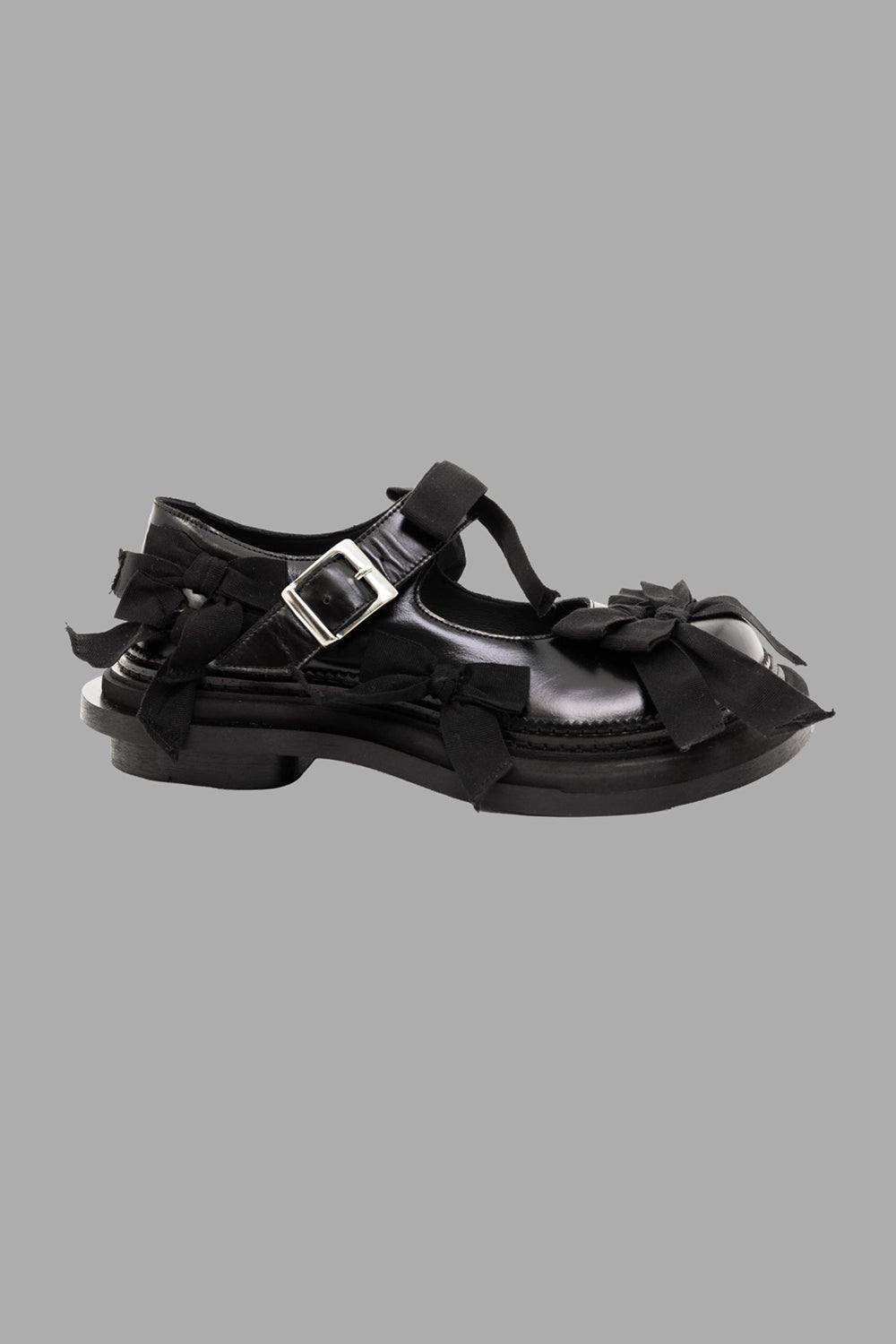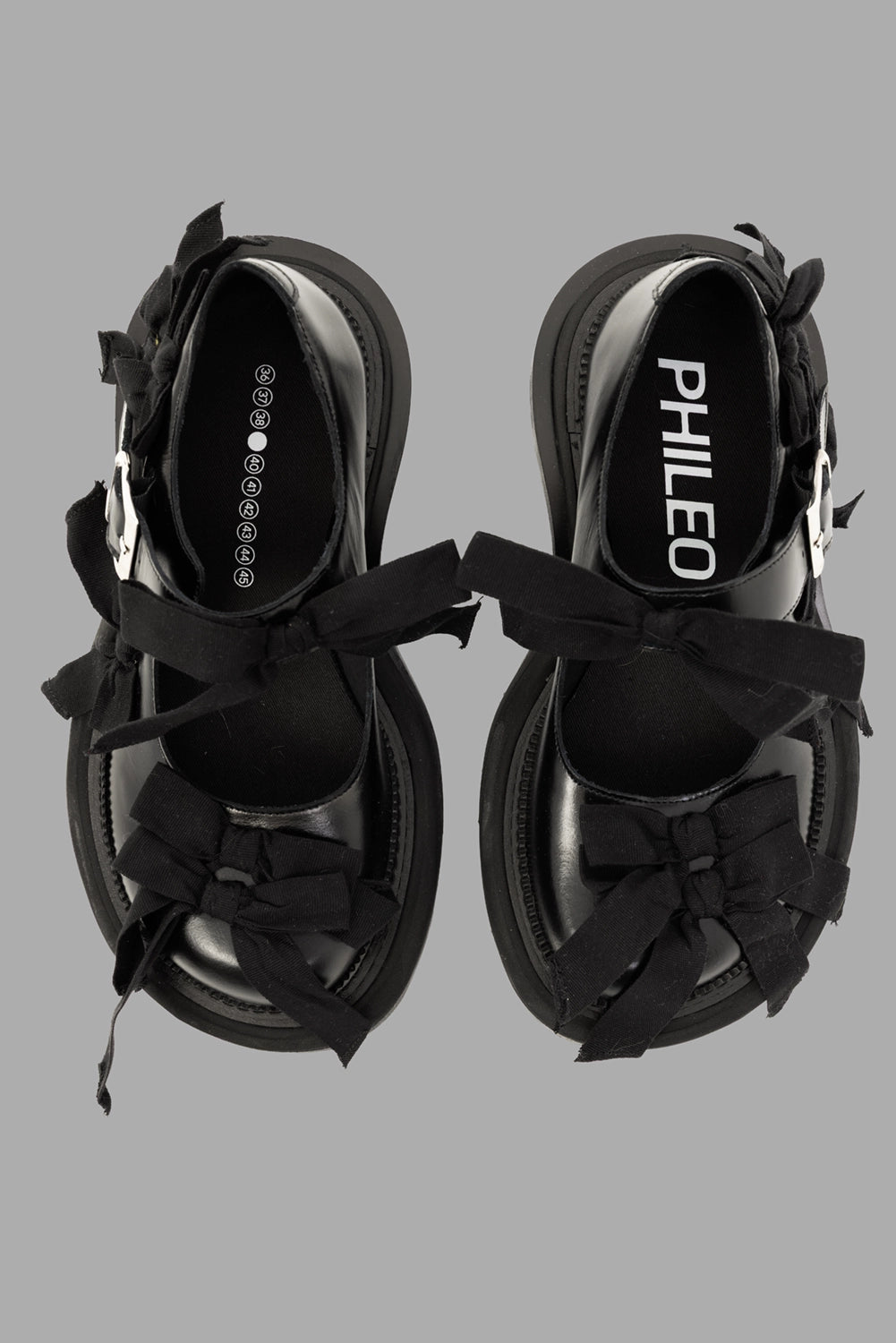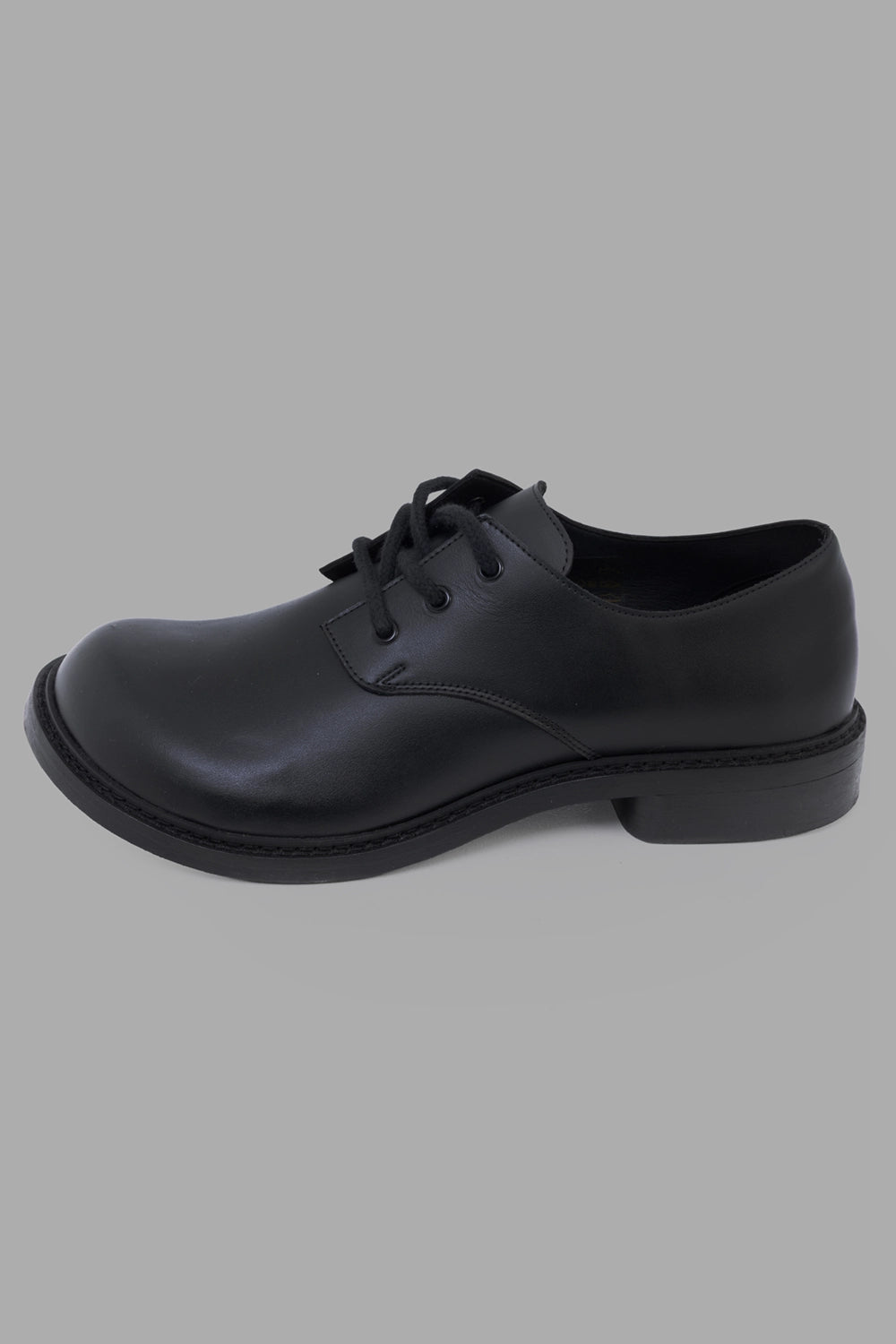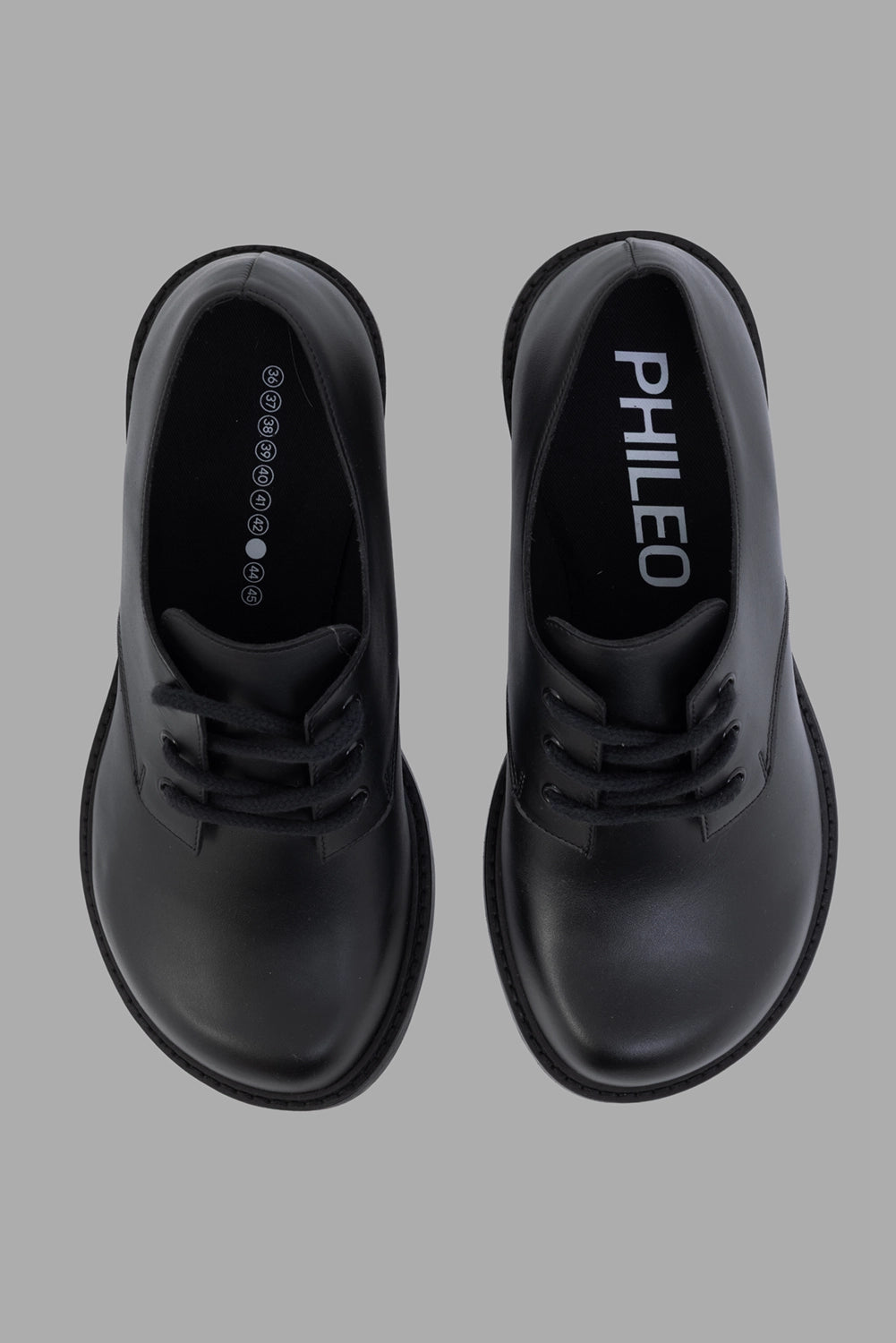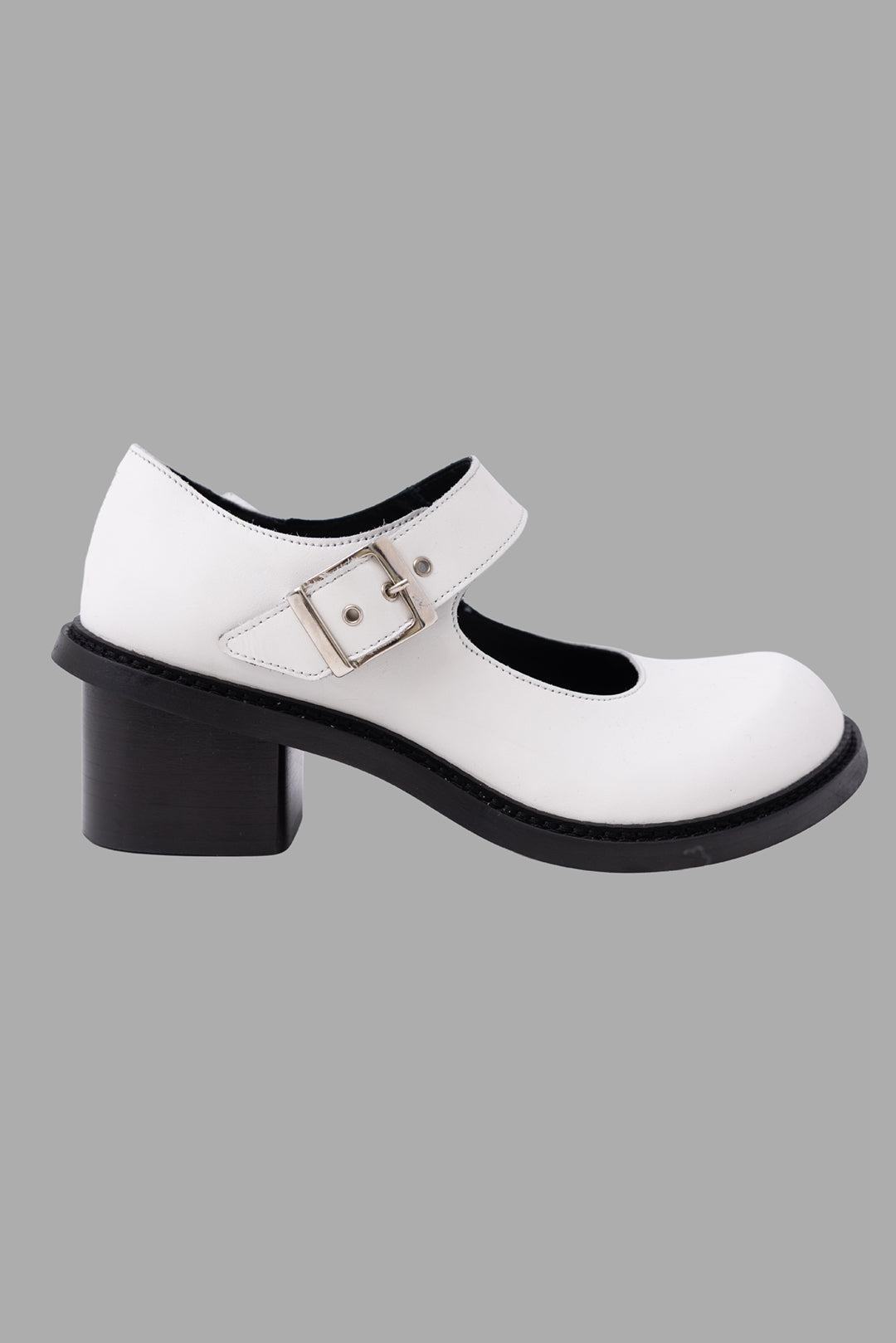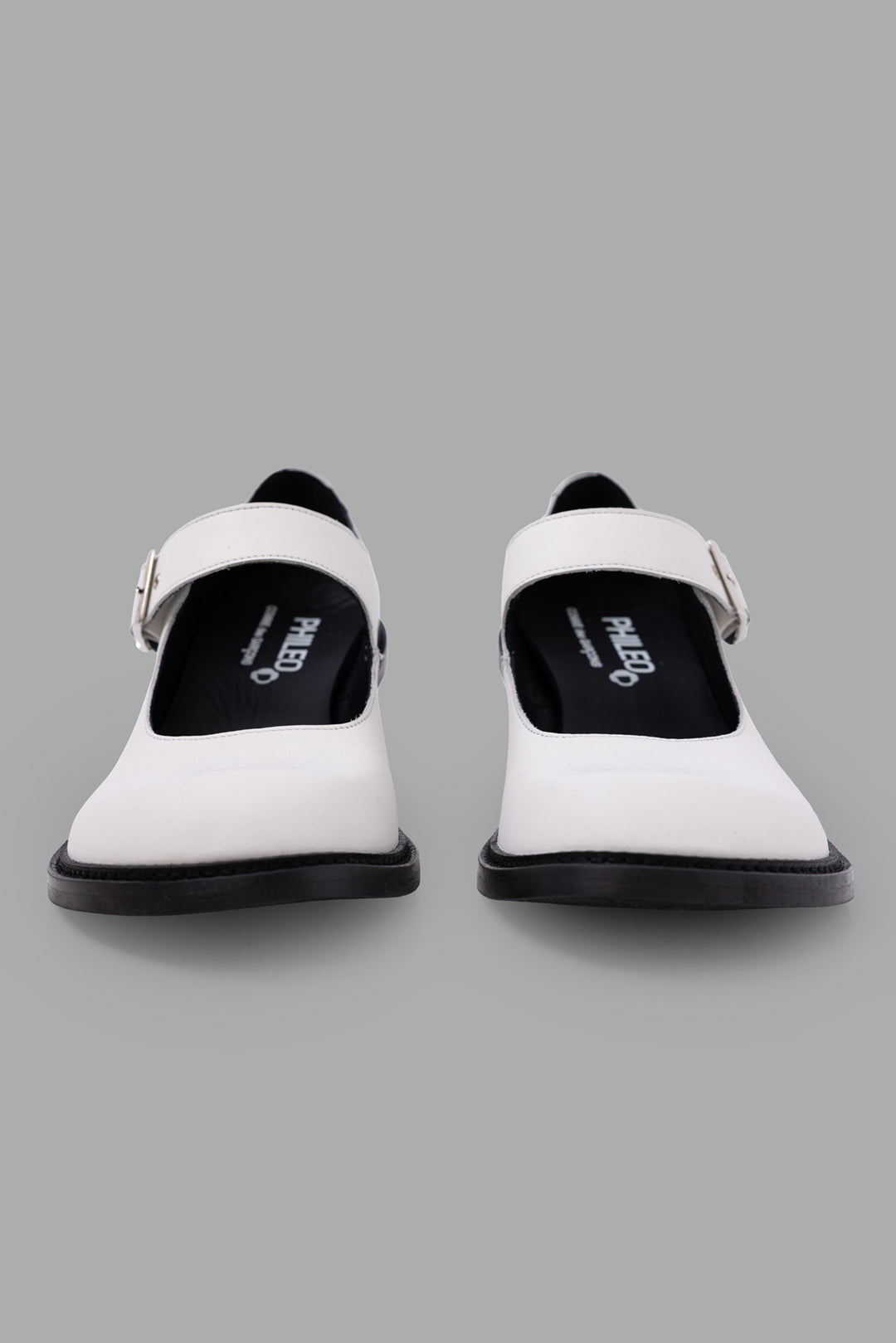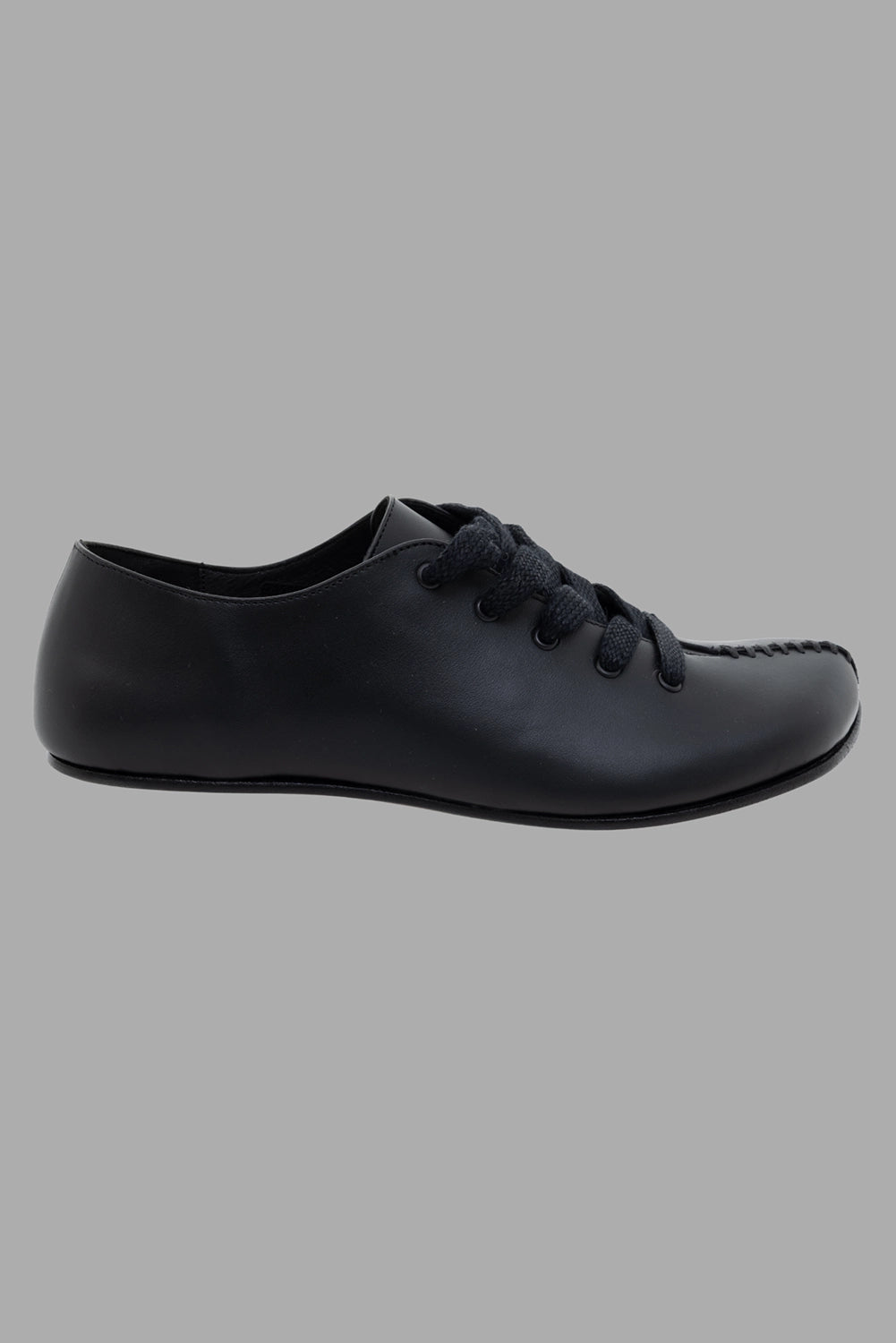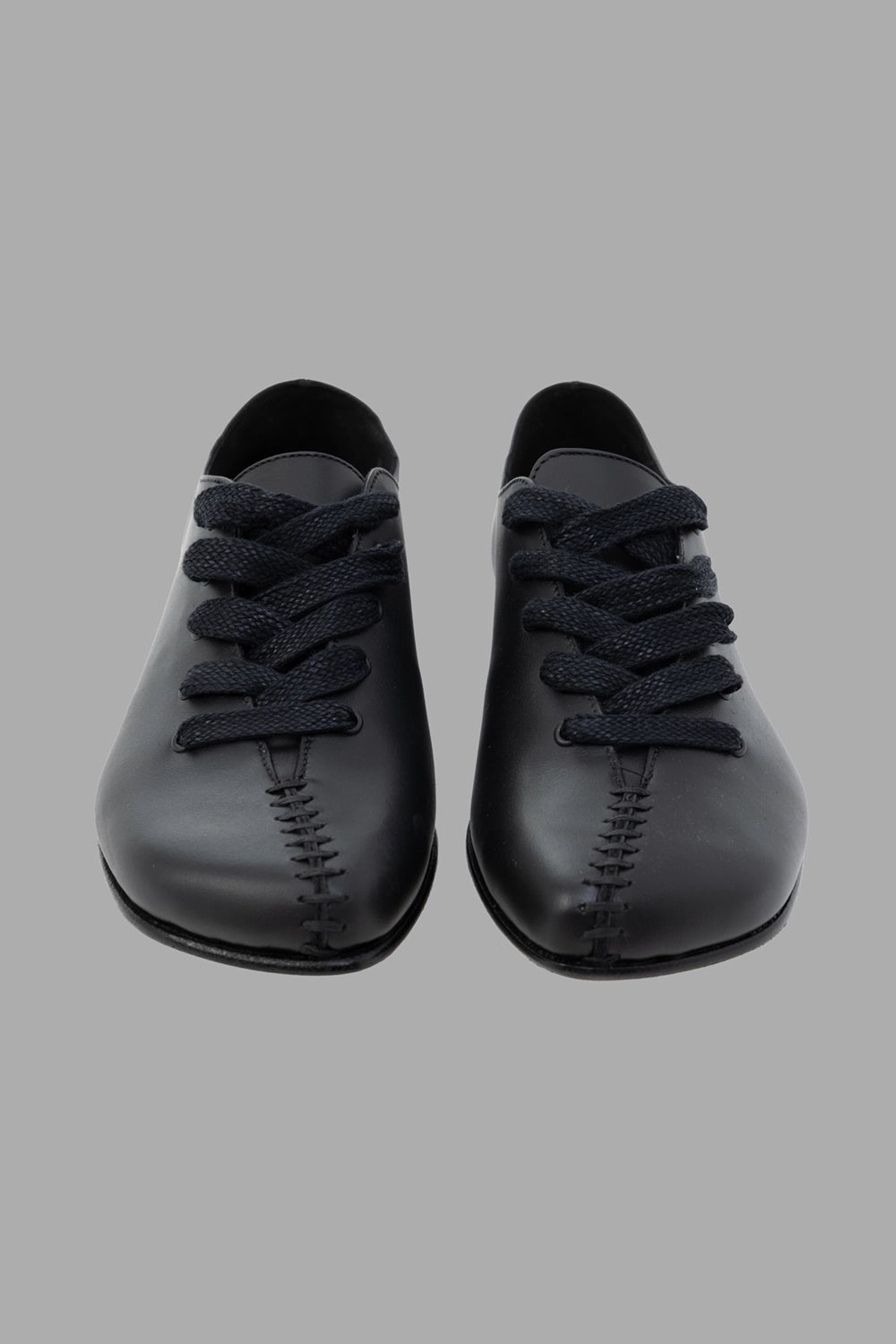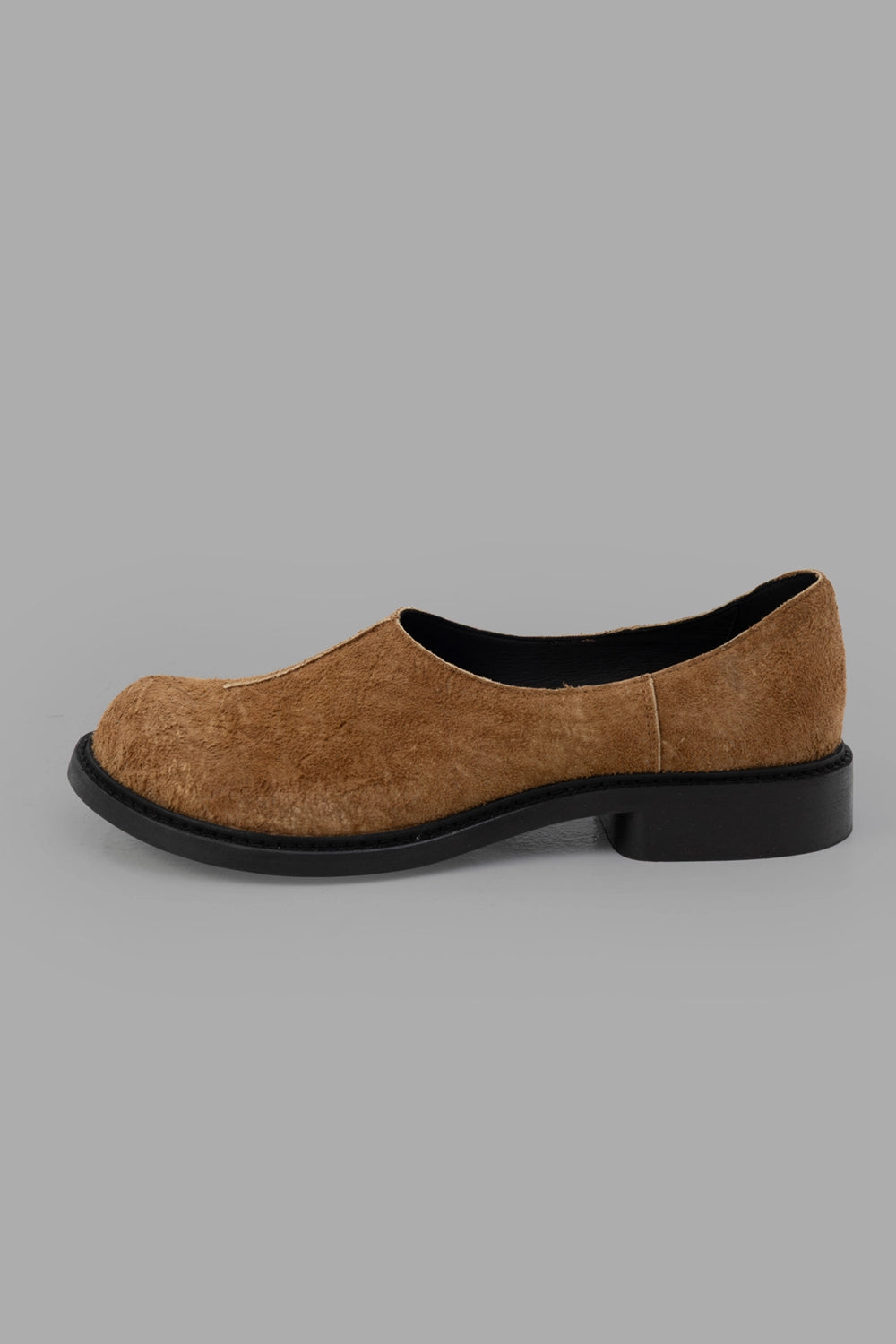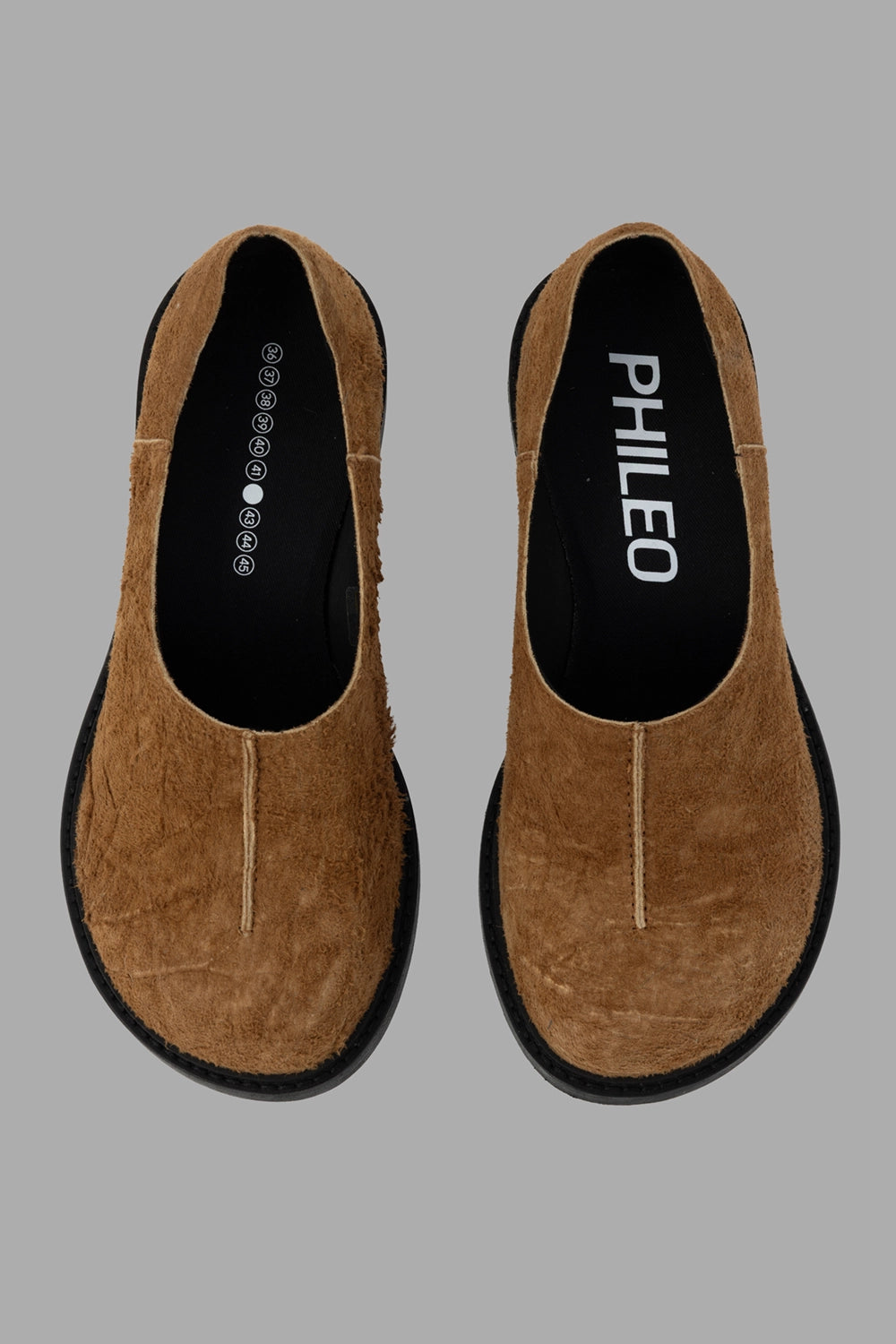Filters
PHILEO is the Paris-born footwear label from designer Philéo Landowski, known for turning classic forms—Mary Janes, derbies, clogs and ballet flats—into crisp, modern objects. On the shelf you’ll find square-toe Mary Janes in patent leather, structured derbies with thick rubber soles, soft Apple Skin® ballerinas, and light mules and clogs; underfoot, the engineering is as considered as the silhouettes. This is footwear that balances sculptural volume with everyday wearability, made mainly in Portugal, and increasingly rendered in plant-based or recycled materials. Collaborations and limited capsules add range—from performance-leaning trainers to experimental editions—without losing the PHILEO line.
Silhouette & Construction
The PHILEO silhouette sits at the sweet spot between utility and finesse. Lasts are squared-off rather than pointy; that geometry creates breathing room at the forefoot and a graphic line from vamp to toe. Mary Janes land on a block heel with a reassuring base and a strap that lays flat across the instep. Derbies are pared-back in the upper—few seams, clean quarters—so that their sculpted soles read like architectural plinths beneath a minimal shoe.
Construction favors stability and clean transitions. Most uppers use a firm counter and structured topline to keep shape, while footbeds are tuned for day-long comfort. You’ll see cemented constructions for a sleek sidewall and crisp edge finish; the outsole designs—often in dense, grippy rubber—add shock absorption and a quiet, confident stride. In collaborative models (from trail-inspired trainers to experimental derbies), the mechanics scale up, but the balance of volume to weight remains precise.
Materials & Finish
PHILEO treats materials as a design language. Patent calf gives Mary Janes a lacquered sheen; smooth leathers are cut close for a taut, tailored look; and Apple Skin®—a plant-based alternative—appears in ballerinas and selected flats for a soft, matte hand. Recycled and bio-based inputs are increasingly part of the build: Bypell® bonded leather, recycled micro‑TPR in outsoles, and canvas or mesh inserts on specific styles. Many shoes are made in Portugal, combining modern tooling with artisan finishing.
Surface treatment is purposeful. Patent uppers reflect light cleanly; matte leathers are lightly waxed to resist scuffs; and Apple Skin® offers a pliant, breathable feel with a subtle grain. Outsoles are engineered for grip and longevity, often with pronounced tread that stabilizes a block heel or platform. Color stories stay tight—black, cream, fireman red, pale pink—with seasonal accents, so the lines read clearly even when details (canvas bows, embossed logos, contrast edges) come into play.
Signatures & Icons
Certain PHILEO designs repeat across seasons and collaborations:
-
075 — Mary Jane: The house take on a strap shoe—square toe, slim strap, block heel—rendered in patent or smooth leather.
-
074 — Mary Jane Super: A bolder, platformed iteration with a thicker sole and bow detail; designed to feel substantial but balanced.
-
066 — Derby Super: A minimalist derby upper set on PHILEO’s sculptural rubber base—a graphic everyday shoe that pairs with tailoring or denim.
-
006.2 — Ballerine (Apple Skin®): A soft, strap ballerina using a plant‑based upper with a textured rubber outsole.
-
035 — Lido Boot: A streamlined boot that showcases the “mainline” sole language and recycled components.
Notable projects extend those codes: ongoing footwear for Comme des Garçons (including vinyl and leather strap styles with exaggerated rubber tooling), adidas EVO SL curated drop at Dover Street Market Paris (a performance silhouette seen through PHILEO’s lens), and Salomon crossovers with trail DNA translated for the city. Seasonal capsules with Clarks Originals, TBS, KIDILL, LGN and Rokh show how the studio’s forms adapt across fashion contexts without losing their clarity.
How to Wear It Now
Weekday, pared-back
Anchor pleated trousers with the 066 Derby Super in black leather. The squared toe and clean quarters keep a blazer-and-knit combo sharp, while the sculpted sole adds stance without feeling heavy.
Evening, spotlight on patent
Let the 075 Mary Jane in black patent lead a column look: slim black dress, sheer tights, and a compact shoulder bag. The block heel and high-gloss finish give height and light without sacrifice to stability.
Off‑duty city walk
Pair straight denim and a boxy jacket with 074 Mary Jane Super in a soft color or with bow detail. Rib socks and a nylon crossbody underline the playful, utilitarian mood.
Travel, pack-light edit
Choose the 006.2 Ballerine (Apple Skin®) for easy on/off at security, then switch to a leather derby for meetings. Both styles share the same sculptural outsole language, so outfit changes stay cohesive.
Fit & Sizing Notes
PHILEO uses European sizing and many lasts are unisex. The squared toe provides comfortable room at the forefoot; heel cups and straps are cut to hold securely without pinching. Mary Jane Super (074) is known to fit slightly large—most wearers size down one EU size for a neat, supportive fit. The classic Mary Jane (075) runs closer to true to size; the adjustable strap adds micro‑fit control. Derbies and clogs are generally true to size; if you’re between sizes or have a narrow heel, consider the smaller of the two. PHILEO’s own size guidance suggests leaving roughly half a centimeter of space at the front—measure foot length and pick the nearest size that gives that allowance. Many styles are Made in Portugal, which typically brings consistent sizing from season to season.
Care & Longevity
Treat each material on its own terms. Patent leather likes a soft, slightly damp cloth to remove smudges; avoid solvents and store away from direct heat to prevent surface clouding. Smooth leather benefits from infrequent conditioning—keep the finish matte and supple with a neutral cream, and brush dirt from welts and tread after wear. Apple Skin® and other non‑leather uppers clean with a gentle wipe; focus on removing grit from stitching and outsole grooves to maintain grip. For strap shoes, check the buckle and strap holes periodically and rotate insoles if the model uses them. When not in use, stuff the toe lightly and store upright; the squared front keeps its line best with gentle support. PHILEO also offers aftercare and repair services on select styles—useful for refreshing outsoles or hardware so the shoes live longer.
Heritage & Today
Founded in 2019 by Parisian designer Philéo Landowski, PHILEO began as a study in footwear as industrial design—simple upper geometries atop engineered rubber forms. The label quickly moved from small studio runs to presentations alongside Paris Fashion Week, often within the Dover Street Market ecosystem. Collaborations became a second language: Comme des Garçons invited PHILEO to push classic silhouettes into sculptural territory; Salomon brought performance know‑how to urban shapes; adidas partnered on an EVO SL activation in Paris; and recent capsules with Clarks Originals and TBS extend the brand’s vocabulary of soles, straps and square toes. In late 2024, Landowski’s momentum was recognized with an Emerging Talent honor from the Footwear News Achievement Awards, underscoring how a clear, material‑driven vision can resonate widely. Through it all, the label has kept its manufacturing anchored in Portugal and its design energy in Paris.
PHILEO’s sustainability framework—internally called Ökotechnique—evaluates designs across four vectors: production, durability, recyclability and supply chain. The studio discloses suppliers and favors geographically tight sourcing to reduce logistics impact. Materials mix includes plant‑based Apple Skin®, Bypell® recycled bonded leather, and outsoles with recycled TPR content; black compounds are prioritized where appropriate to improve recyclability. The aim is pragmatic progress rather than perfection: extend wear life (through sturdy rubber bases and serviceable parts), reduce virgin inputs, and be transparent about what each style can and cannot do. It’s a responsibility stance that sits naturally with the label’s industrial, longevity‑minded design.

